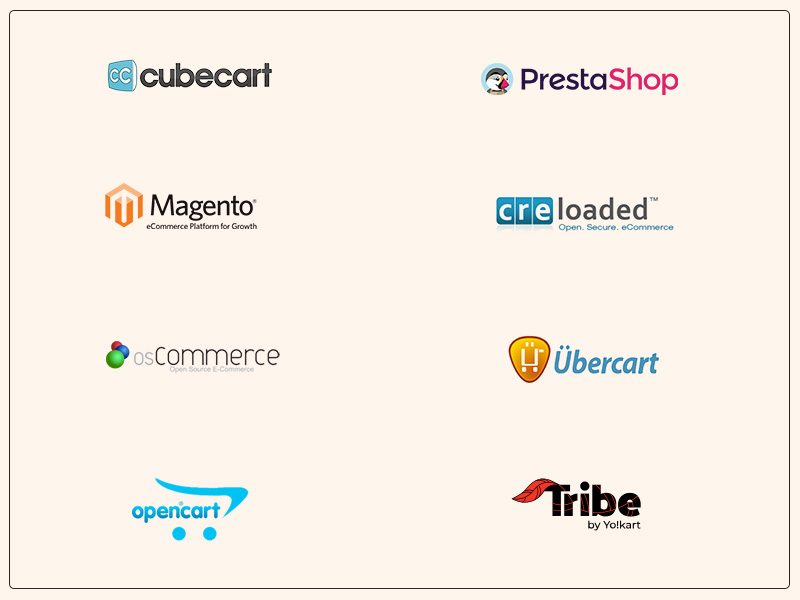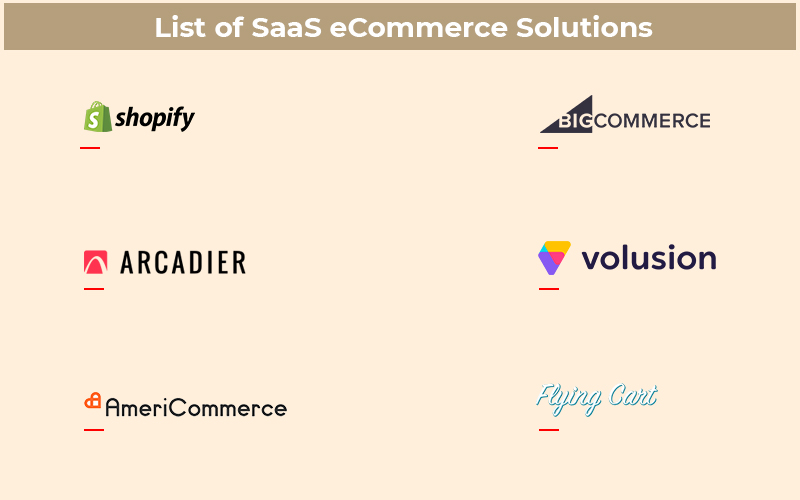Post Updated On: 5th May, 2021
eCommerce platforms have become a reliable source of finding and purchasing new products. They provide people the luxury of ordering their favorite items from the comfort of their four walls and have emerged as a lucrative business option.
Unfortunately, many entrepreneurs are unaware of the direction to launch an eCommerce store. Unlike the era of the 2000s, today programming knowledge is not necessary to start an eCommerce website. Several readymade solutions simplify the job for you. Pick one that best suits your budget and requirements and get started.
In this article, we have discussed the most prominent types of eCommerce solutions in detail. After reading till the end, you will be able to decide which one is the best eCommerce solution for your needs.
Table Of Contents
Different Types of eCommerce Solutions
Shopify, BigCommerce, Magento, OpenCart, Yo!Kart and Growcer are some renowned eCommerce solutions. However, all of them fall under different software categories. To be precise, you can divide them under the following:
1. Open Source eCommerce Solutions :
Open-source software is a community approach to website development. All solutions that fall under this category are free and available at a public domain. Consumers can download them easily and get a lifetime usage license. Some popular examples of open-source software that you may recognize are LinuxOS and FireFox.
Open source software revolutionized the eCommerce industry in the early 2000s by providing small business owners the web mileage to sell their products and services online. Scroll below to see the list of most renowned open source eCommerce solutions.
Pros of open source eCommerce solutions:
- Open source solutions can be hosted on any server. There’s no commitment to a specific host
- Most of the PHP/MySQL-based open-source eCommerce solutions follow the MVC structure and are scalable
- Open source solutions are free to customize without any obligation
- Without any customizations, open-source eCommerce solutions are also the most affordable
Cons of choosing open source eCommerce solutions:
- They are less secure when compared to hosted and custom eCommerce solutions.
- Readily available support from software manufacturers is not available.
- Maintenance is often not provided with open-source eCommerce solutions, and when provided, it is not free of cost.
List of open source e-commerce solutions available online:

- Magento Commerce – Suitable for Medium and Large Businesses
- OpenCart – Suitable for Small and Medium Size players.
- Tribe by Yo!Kart
- OScommerce – Suitable for small businesses and startups
- PrestaShop (PHP/MySQL)
- CubeCart (PHP/MySQL)
- CREloaded (PHP/MySQL)
- Ubercart
Looking for a custom, secure, and easy to set-up ecommerce platform?
2. SaaS eCommerce Solutions
SaaS (Software as a service) eCommerce solutions gained popularity after open-source solutions and become one of the most prominent and affordable types of eCommerce software. As the name suggests, under SaaS, the software provider sells its software as a routine service, which implies the recurrent costs. Major SaaS solution services provide various packages for their solutions that are available at varying prices and auto-renewable.
Pros of using hosted eCommerce solutions:
- The solution provider hosts your eCommerce store on its own servers, meaning you aren’t responsible for server management
- The solution provider is also responsible for any flaws and malfunctions in the website
- SaaS packages are available at various pricing, thus they fit in all budgets
- You only require basic computer knowledge to manage your eCommerce store with SaaS eCommerce solutions.
- You can upgrade or downgrade your package anytime depending on the changing business requirements.
Cons of hosted eCommerce software solutions:
- You don’t get the freedom to select a hosting provider of your choice
- Adding custom functionality is costly and requires a development team
- Only a limited number of eCommerce themes are available
- Not so cost effective in the long run due to recurrent payment model
- Only permitted third-party plugins can be integrated on SaaS solutions
- Some SaaS solutions have fixed ceilings on sales figures. Once you reach the ceiling, you must upgrade to the bigger package
- Some SaaS solutions charge a transaction fee on every order
List of SaaS eCommerce solutions:

3. Readymade eCommerce Solutions
Moving on from SaaS solutions, readymade eCommerce software is the new trend in the eCommerce development industry. Readymade software is developed keeping various use cases in mind and often does not require any customization to meet your online business requirements. In brief, it has all essential features required to start a feasible eCommerce business. You can purchase a readymade eCommerce solution to start a cab booking business, food delivery service, marketplaces like Amazon, etc.
Pros of using hosted shopping cart solutions:
- Readymade eCommerce solutions are available in both hosted and self-hosted categories. Giving the maximum flexibility to the business owner.
- They are easy to set up due to minimum customization requirements depending on any additional feature requirements.
- On-boarding is easy and proper documentation of the software is provided.
- Readymade solutions are available for specific use cases. For example, if you want to start an online marketplace like Amazon, you won’t be paying for any unnecessary features like a booking calendar or buffer period, which are important for a rental eCommerce website.
- Support is easily available if a problem exists.
- TPis and APIs are also available for readymade eCommerce solutions.
Cons of hosted shopping cart solutions:
- Number of themes is often limited. However, one-time homepage design changes are included in the majority of purchase contracts.
- Auto-update option is not available. You may need to contact the manufacturer everytime a new version is launched.
List of Readymade eCommerce Solutions:
Yo!Kart, developed by FATbit Technologies is a fully-customizable digital marketplace solution that comes with 1-year of free technical support and the option of selecting any hosting service provider.
Comparing Open Source, SaaS and Readymade eCommerce Solutions :
| Parameters |
Open Source eCommerce Solutions |
SaaS eCommerce Solutions |
Readymade eCommerce Solutions |
| Setup Cost |
No setup cost for self-setup. Otherwise, the cost can vary from one IT company to another. |
Low setup cost. |
Low setup cost. |
| Technical Knowledge |
Technical knowledge to some extent is required for managing open source solutions. |
Technical knowledge is not required. |
Technical knowledge is not required. |
| Hosting |
Open source solutions are self-hosted. Thus, the business owner gets the choice of hosting provider. |
SaaS solutions are hosted by the solution provider. The choice of hosting is not available. |
Both hosted and self-hosted readymade solutions are available in the market. Giving maximum flexibility to the business owner. |
| Features |
Limited number of features. |
Various free and paid features. |
All features for a particular use case are pre-integrated. |
| Support |
No support included – The owner must hire a professional support team separately. |
Technical support is available 24/7. |
Free technical support is available for a limited time period mentioned in the contract. |
| Upgrades |
Any customizations and software updates have to be done manually. |
Auto-software updates are available but the owner might need to contact the solution provider in case of any customizations in the code. |
The owner needs to contact the solution provider in case of software updates and code customizations both. |
| Third-Party Integrations |
Any TPI can be added on an open-source solutions |
Only support selected TPIs. |
Only support selected TPIs. |
Finding the Best eCommerce Software Solution
If you are still confused which eCommerce solution is the best for your business, the following questions will assist you in making the final decision:
- What is your level of computer knowledge? If you are a programmer who is well-versed in coding, there is no need to spend money on paid software. You can develop your own eCommerce software at minimum costs with the help of open source solutions.
- Do you have a large scale budget? If yes, you can opt for both readymade or high-end packages of SaaS solutions. Running an eCommerce store with these solutions would be more efficient for you.
- If you want very specific functionality and do not require any additional features, go for readymade eCommerce solutions that give you the maximum value for your money.
- If you do not want to pay lifelong recurring payments for your eCommerce solution, open source and readymade solutions are more suited for you. While SaaS solutions may look cheap, in the long run they are the least cost effective.
- If you want high-level tech support, go for SaaS or readymade eCommerce solutions.
- If you want an eCommerce solution for your existing website, go for an open source plugin like WooCommerce.
- If you want to upgrade your website gradually, go for readymade or SaaS solutions.
Once you have figured out your exact requirements, you can start searching for a reliable eCommerce solution that satisfies your business needs. In case, if you are still unable to figure out a solution, the following key factors that aren’t directly related to the software solutions will assist you further.
- Product line – If your product line is small, go for open source solutions. If it is large with multiple categories, subcategories, and product attributes, then go for readymade or open source eCommerce solutions.
- Your Technical Team – If you have or can afford a large team of developers then open source solutions are your best option.
- Turnaround Time – Open source systems take the longest to become operational. If you want to start quickly, then readymade and SaaS solutions are your only two options.
Final Thoughts
With so many eCommerce solutions, it is obvious for an aspiring owner to have mixed thoughts and second opinions. However, if you can put down a list of required features with your budget and expectations, that will simplify the task. No matter which eCommerce solution you choose, don’t forget to add a unique touch to your website to make it look premium and distinguishable.




Comments (3)
 Molly Horan
Molly Horan
 Ryder
Ryder
 FATbit Chef Post author
FATbit Chef Post author
I have been using BigCommerce from quite some time now but have decided to switch because I’m tired of the recurring monthly hosting and transaction charges. As rightly pointed out, the store was nowhere easy to setup or customize. Once it was setup, everything worked smoothly. The issue is, now after 2 years, I feel I want more customized options which are easily supported by an open source system. Have decided to get my new store built on OpenCart. Thanks for reassuring me about my choice.
Hello! I realize this is kind off off-topic hhowever I had to ask.
Does operating a well-established website such as yours require a lot
off work? I am brand new to blogging but I do write in my journal daily.
I’d likke to start a bllog so I can eeasily share my own experience and thoughts online.Please let mee know if you hafe
any suggestions or tkps for new aspiring blog
owners. Thankyou!
Hi Ryder,
You can setup your own blog on WordPress which is a free web software to create blog/websites. Free WordPress blogs require no technical know-how but if you want to implement some customization in design and functionality, only experts can help you.
You can discuss your requirements with our experts for free advice. Contact us